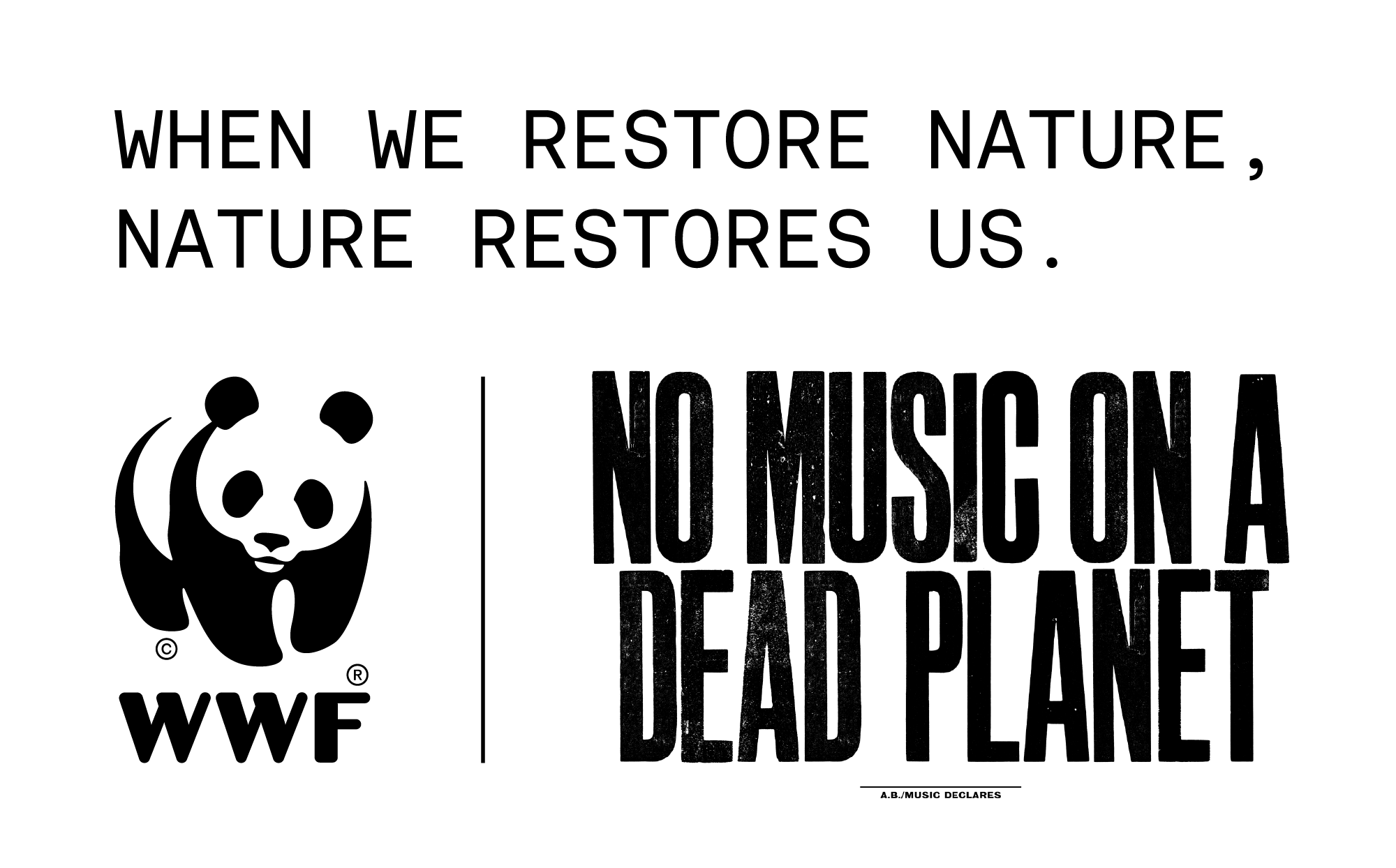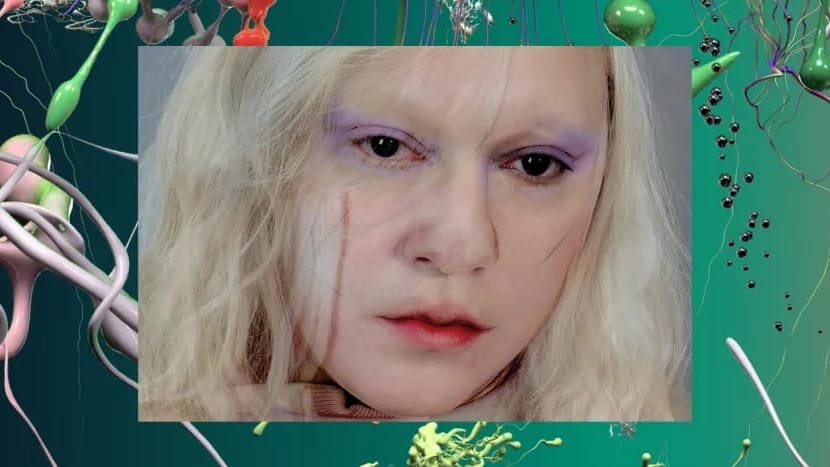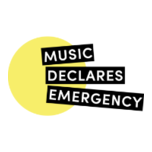"It looked like a very beautiful sunlit graveyard, with beautiful grave stones."
ANOHNI's description of the dying Great Barrier Reef has been haunting me like an unrelenting earworm.
I can’t stop thinking about ANOHNI's Instagram posts either. Like this one, which at first glance seemed lovely. Then I read the caption and the awe became an arghhhh.…
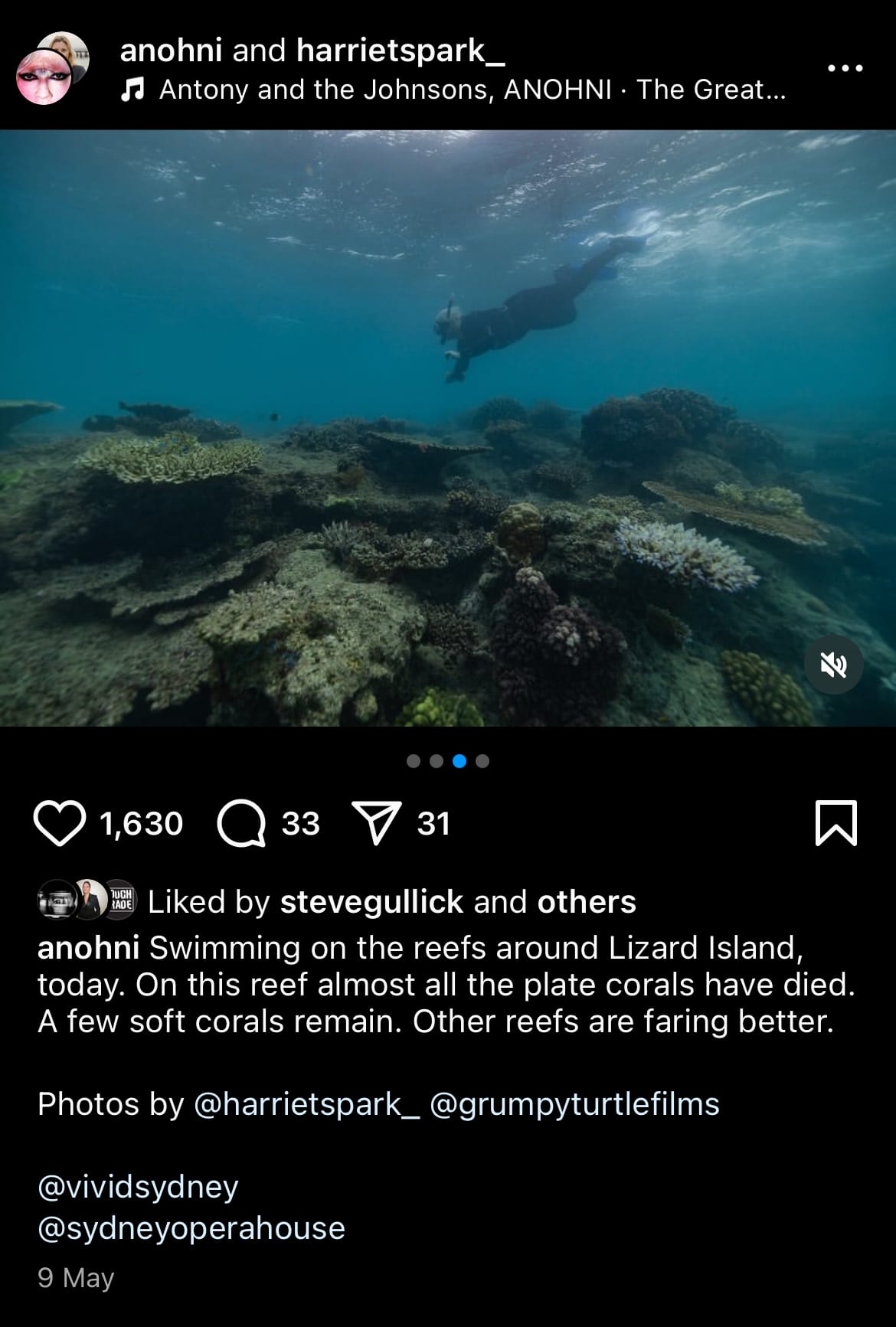
It’s symptomatic. A glimpse of our planet’s slowly decaying carcass with more than half of The Great Barrier Reef lost since the 1990s.
Some of the coral is “fluorescent” said ANOHNI to ABC’s National Radio Hour before pointing out that the UNESCO World Heritage site “looks like a war zone.”
The multi-award-winning songwriter's reaction to eyeballing the Great Barrier Reef will be channelled into a performance which takes place at Sydney Opera House during this year's Vivid Festival from 26th-27th May. At the winter arts event, she’ll be sharing videos from the trip to the reef, soundtracked by "an ocean of music" created to support people speaking their undeniable, unavoidable, iridescent, inconvenient truth about what is happening to our planet.
Talk of the fluorescence, which is coral's stress response before it dies, and the rubble the sea bed has become, is discombobulating to hear and set off a series of interconnected visuals in my mind. What made the short radio interview all the more moving is that at times ANOHNI speaks as if any emotion in her voice is as desaturated as the reef's polyps. With no dramatic pauses or garnish to the intonation, the words themselves - poetic, accepting, factual - wallop with their gravity.
“Are the experts hopeful? No they’re not, they’re talking about triage and harm reduction,” ANOHNI explains, having just dissected for the host the ways in which both the scientists she’s spoken to who deal in empirical evidence, and the generational knowledge of spiritual elders she's met, are rapidly moving from a stage of acceptance to what sounds like anger.
The prognosis for the planet hasn't been good for decades. Some experts say it's terminal, others say we still have time if we treat it as an emergency and act now.
Action is as slow as a ship full of oil but the alarm bells are ringing, the sirens are searingly loud, but those blowing the ref's whistle are ignored. We've increasingly seen the headlines about record global temperatures, extreme weather events, the terrifying floods, the live-streamed fires, and now the signs of our heating climate changing our oceans. And still, despite all of this, change seems like something people in power are putting off until tomorrow.
For those paying attention, seeing the theoretical impacts become reality, it feels as if we are now entering into a period of passionate despair. For some in the climate movement, this may feel - especially at their darker moments - like defeat. For others, it has renewed their sense of urgency and clarified their mission.
This river of emotions all mirrors the various stages of grief. For instance, the loud voices bemoaning 'netzero', they're still stuck at the phase of denial (and I wish they were right!). Their often baseless feelings also reflect and refract so much of the heaviness and interconnected issues in the world right now.
A Jolt
I nearly began this newsletter with something like: ‘It was at this moment that the numbness turned into pins and needles’ but despite writing this in the first person, this isn't about me or you but all of us. It's not a despondent numbness, it's a collective grief.
Much like ANOHNI and so many artists and photographers, as a writer I'm just another lens looking at something, magnifying it, reframing it. Journalists, columnists, and content creators can try to nudge you to engage with their reporting or we can do as a broadcaster I saw on the news did, after a segment about declining bee populations, without a hint of irony he said "some lovely pictures there..." as if it was some light and breezy 'and finally' story about a flower show.
The personal is political. Everything is political. Everything is connected but not always in obvious, three-word-sloganable ways.
When I say everything is connected, I mean that even the horrors of the world are part of the reason for my lack of weekly newsletter lately. To be honest, I've felt somewhat overwhelmed. You could call it writer's block. I've been stuck processing some of the speeches I witnessed and conversations I had at Tallinn Music Week, which had nothing to do with climate grief but also everything to do with it.
The conference took place a couple of hours from the Estonian-Russian border, where I encountered musicians from Ukraine and the baltic region who increasingly use their art as resistance, not against the system they live in but against the looming threat of assimilation and oppression. Their music is such a key part of their personal and national culture and identity. There's so much nonsense in the world about free speech but their way of life and their freedom of expression, as well as their ability to be a part of global movements and international music scenes, is threatened by what might come next for the neighbouring pariah petrostate.
Introducing: Maryana Klochko
As a quick interlude, here's Maryana Klochko, who was one one of the extraordinary Ukranian artists I saw in Tallinn. Her dreamy euphoria has pockets of unsettling nightmarish intensity - definitely recommended for fans of Austra, Kelly Lee Owens, Bjork, etc.
ANOHNI's words broke through my paralysis and here I am, writing again.
Her matter-of-fact acceptance of the devastation she saw on the sea floor and describing it as a 'warzone' reminded me why these stories matter: music and art and journalism isn't just a way to document our various catastrophes, it's a first line of defence. Art's power is about refocussing the lens and envisioning what's possible. Art can act like blueprints for the imagination and warn what's coming over the horizon.
On hearing ANOHNI's ABC interview, filled with the vivid and visceral descriptions, I felt myself jolt. Both physically (as if I had pins and needles) and psychologically.
Perhaps I was in a state of mourning, stuck in a so-called doom loop about all the manmade human suffering we’re witnessing, and not just under the sea... From what legal experts at human rights orgs and leading scholars alike are calling a genocide to finding myself being swept up in a tsunami of conversations in the climate justice movement, my sitting down to write about music and sending it out into the world has felt futile (and to be fair, often, that’s the joy of it!).
ANOHNI reminded me that so much of this world of woe is also part of the reason music gives me that bro “woah!” when I hear something extraordinary. A song that extracts you from everything that’s wrong in the world or brings it into sharper focus is one of the pleasures of life.
Looking away feels cowardly but constantly staring at atrocities, unable to change the situation, feels unbearably hopeless. Whether it's to children in Gaza or to musicians in Kyiv or seeing the collapse of our biosphere, the rapid transition of wealth to billionaires or the rise of fascism, it feels bleak out there. Especially the latter, as the rise of what some call ecofascism, which is often funded by the people involved in crimes against humanity and those who are committing ecocide (that means the intentional or negligent devastation of nature, often considered a crime against the environment), through their investments in fossil fuel and the war industry. Often, the dehumanisation and disconnection from our planet, from nature, from its inhabitants, is a byproduct of all that consumes us and our resources, and for what... shareholder dividends!?
Whether it's coral reefs or cultural identity, the threat and destruction is often entwined. And the perpetrators and profiteers are similar - if not exactly the same people.
In the mists of despair, ANOHNI offers clarity
“What I’m talking about isn’t political” injects ANOHNI when the presenter half-suggests caring about nature or forms of environmental activism is a left-wing political act. It’s one of those rare moments that feels like a fish slapping you across the face, in a hurricane, like that weather reporter meme set to New Order’s Blue Monday.
But what can I/you/we do individually with these emotional responses to the science and the fact-based reporting that shifts us from shock to denial to overwhelmed to despondent? How do we - collectively! - navigate the desire to do something whilst also in the oscillating throes of rage and despair?
It’s everso easy to be drawn into trauma dumping online (hi!) or trolling politicians on social media (no comment) or even writing them polite emails with a rhetorical flourish (also me). It’s great to congregate and raise our voices in protest and to be part of peaceful, visible, collective action on the streets. Yes, you could even petition or write open letters with famous names fronting them… but we all know in our heart of hearts that clicktivism is not the answer and that those in power only care about winning our votes.
None of this resistance or building a new world works if the message is too complicated to onboard millions more.☔︎
We can post and shout all we want but those profiting from destruction can just put their diamond-encrusted noise cancelling headphones on and fly their private jet to the bunkers they're building, whilst betting against our futures. Or they could get their look-over-there media wing to start stirring up moral panics about flags or statues.
This much I know: What we need isn't just an upgrade but a new system. We're caught between conflicting utopias - the planet we need to survive, is the world billionaires want to extract from. Their vision is killing ours, but there are many, many more of us.
To get there (ok, I don't know the exact destination), we need to rewire the status quo, and that starts with ourselves. I’m not suggesting you become some off-the-grid cider punk, but why not try something as simple as switching your bank account?
I know, I know... individually, small acts won’t change much. Have a look at the animated infographic at the end of this piece, which fires up in my mind's eye whenever activists are met with the accusatory "but you have an iPhone" or the not-that-hypocritical "did you drive here today???"
Small acts can make a big difference and big artists are leading this in the industry. For instance, Massive Attack and Billie Eilish turning arenas vegan for the night. It's tiny nudge for audiences (and arena owners) but it may be the first ketchup-smothered taste of what’s possible that some people need. Why? Because meat and dairy production is responsible for up to 20% of global greenhouse gas emissions - twice as much as plant-based food. Whilst audience travel creates the bulk of the emissions for an event, a recent report by A Greener Festival found that food alone makes up over a quarter of the remaining emissions where meat is served, though this shrinks to less than 10% for vegetarian events.
A slight tangent but on the subject of audience emissions, better public transport was the third most popular reason 8,000+ music fans who were surveyed gave as a reason they don't go to more grassroots shows.
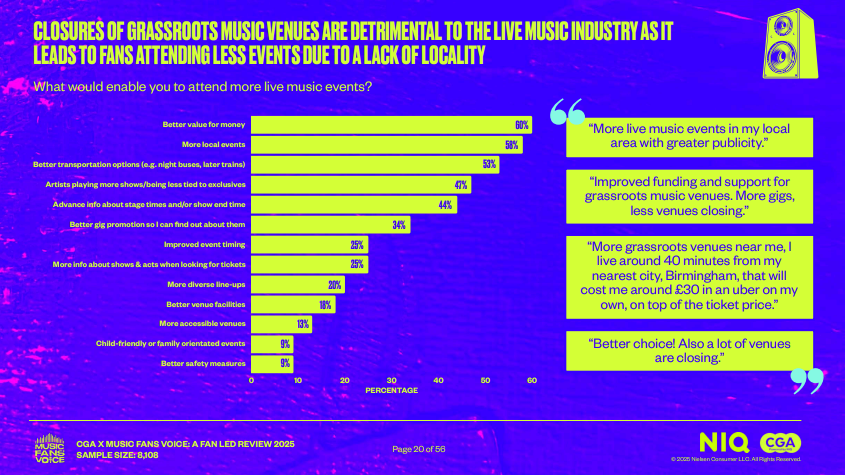
Principles are important. We've seen a lot of artists taking a stand lately, often calling for big business to divest at a cost to themselves. Things are precarious for musicians, so this isn't just kinda brave to take a stand, knowing there could easily be a backlash in these divisive times, it's also costing them money.
For example, Gazelle Twin took a stand this week against the arms industry (go show your solidarity and maybe pick up a copy of their record or a hoodie)
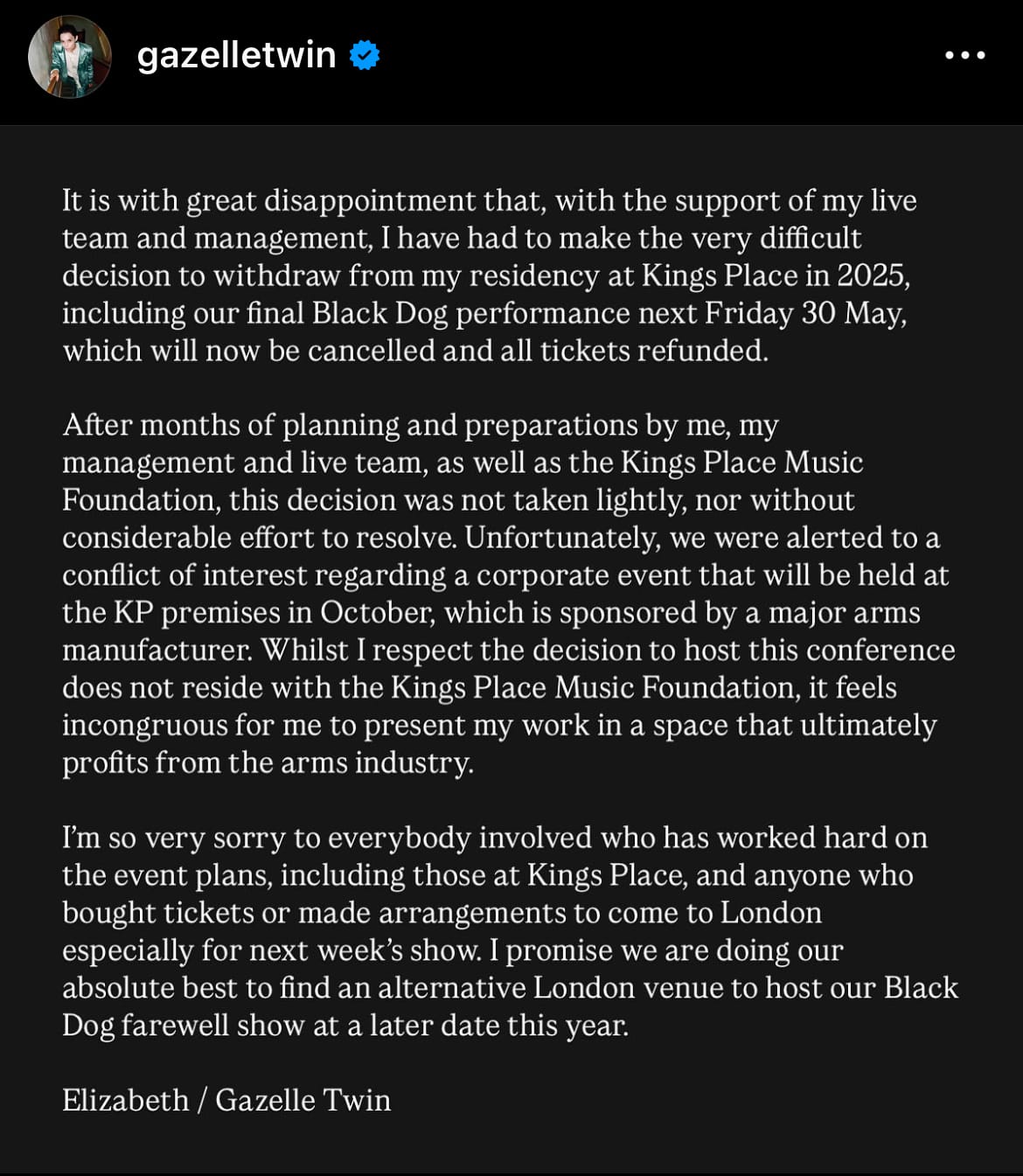
I think a lot about these everyday 'free market' decisions we make and how every purchase is a vote for which utopia wins. As a music fan, perhaps consider if you want to use a streaming service that donates to Trump’s inauguration, funds Joe Rogan hosting climate conspiracists, and whose CEO spends his wealth on war tech.
At times, any form of resistance can be uncomfortable. As regular listeners will know, I’ve been trying to gently bring some of this energy onto the Drowned in Sound podcast but I’m aware some of these topics are dystopian and bleak so it's not something I dwell on the negatives of, instead speaking to people working on the solutions to the challenges the industry faces but also that we are up against.
All movements need to bring people along with them, rather than flinging things (yes, like this email) into the vague orbit of those who might not be as engaged or may even have a totally different ideology or the way things have been said fail some kind of political purity test. This is a challenge artists and anyone with a platform faces. Often the fear of sparking outrage in these divisive times, when even international law and preserving life on earth are controversial, which leads to silence from many artists and fans alike. It's also why it's so incredible to hear acts like ANOHNI leading the way so eloquently and movingly and inspiringly.
I'll leave you with this thought that is my other earworm at the moment: Music touches every surface of our life. From the first time I blasted a Motown record at the age of 5 unaware of its connection to the civil rights movement to shouting along to Rage Against the Machine at 15 to reading up on the meaning of Dead Prez and Bikini Kill tunes at 17, music has always impacted me and then slowly changed me. My mission now with DiS and my work elsewhere, is to - and this might sound cringe - harvest the seeds of change and harness the energy musicians are beaming out (that definitely needs work!). All the while thinking big, remembering that change is often something small, that happens incrementally.
The last few weeks and months have been a great reminder that we need to be primed and ready for change individually, at a wide range of intersections, before it can happen collectively. We also need resilience as much as resistance because whilst they're building us a graveyard, we're still here, fluorescent, furious, and impossibly, beautifully alive... but sometimes we're so woke that we're kept awake at night.
ANOHNI's must listen interview is only 12mins, archived here:
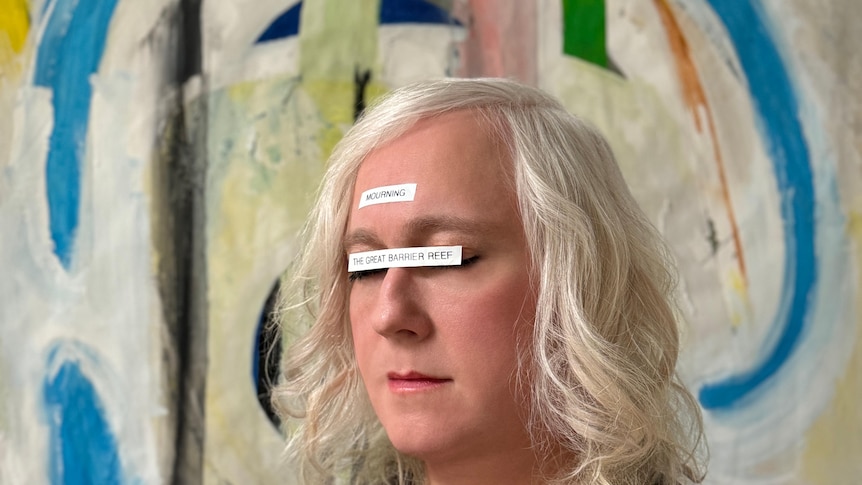
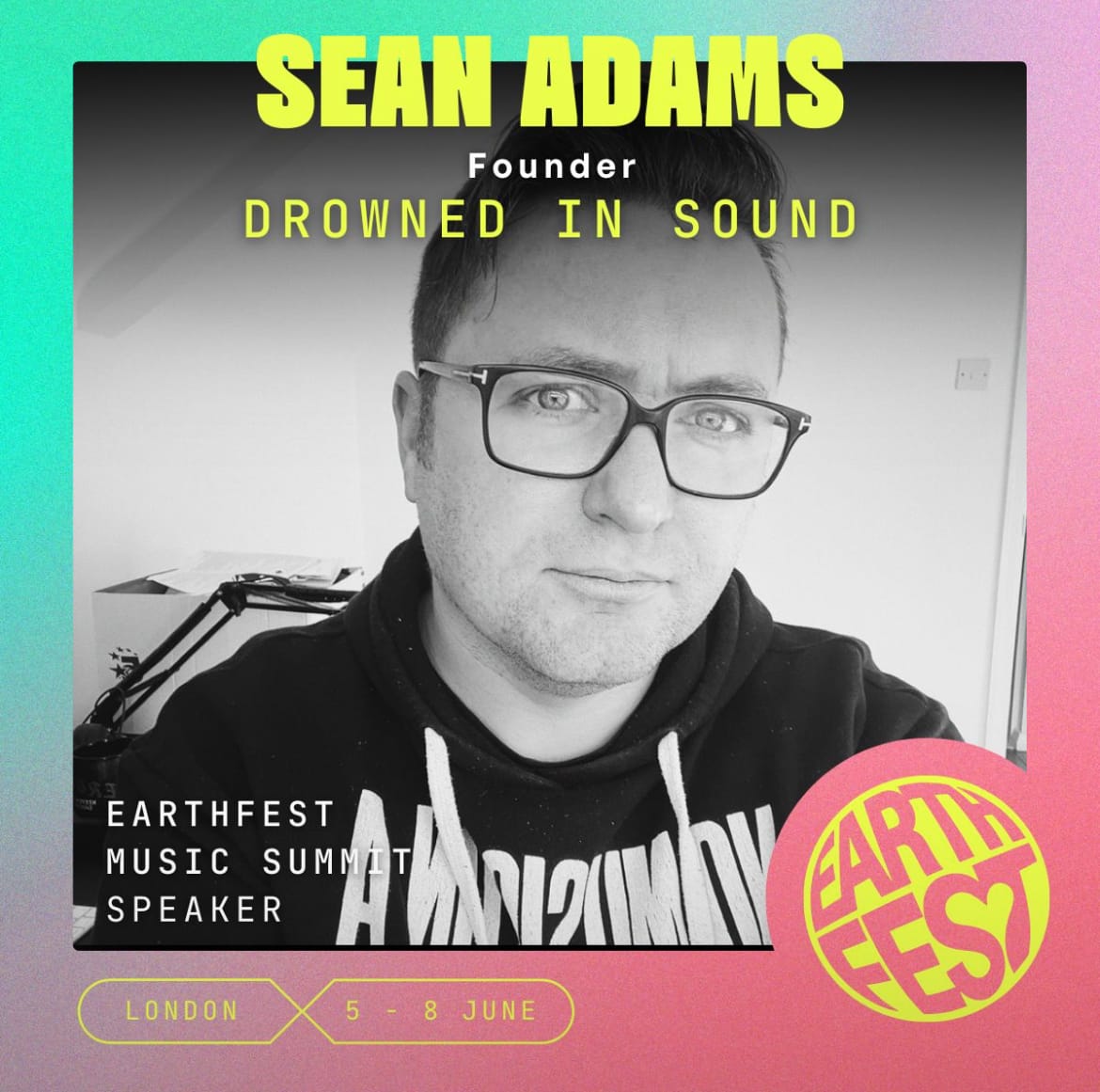
Throughout June, expect more about the purpose of music and also some special commissions from writers from Ukraine. I'll also be starting the month by speaking at EarthFest in London (I also noticed that Dale Vince has a discount code on his Insta).
Also, Billie's soon to bring her climate conference back to London, and if you can't attend, you can stream it online.
If you enjoyed this article, please consider becoming a paid subscriber or leaving a tip.
☔︎ = a thought for a rainy day in the future: "climate" is an intangible concept which makes it quite a complex idea compared to "manmade natural disasters" or "profiting from the planet" whilst talk about "carbon emissions" might as well be Latin to some people. Do we need to reconsider how we discuss the "crisis" and rebrand the "emergency"?
Related
The most recent Drowned in Sound podcast episodes explore exactly these themes—recorded live from Tallinn, they include discussions about music's role in planetary crisis, and you'll even hear the haunting sound of a glacier melting that resembles a synthesizer.
Context: Your carbon emissions in the context of corporations and countries
Details about Massive Attack's vegan arena shows

Moya Lothian-McLean on private equity, noise complaints, and live music festivals
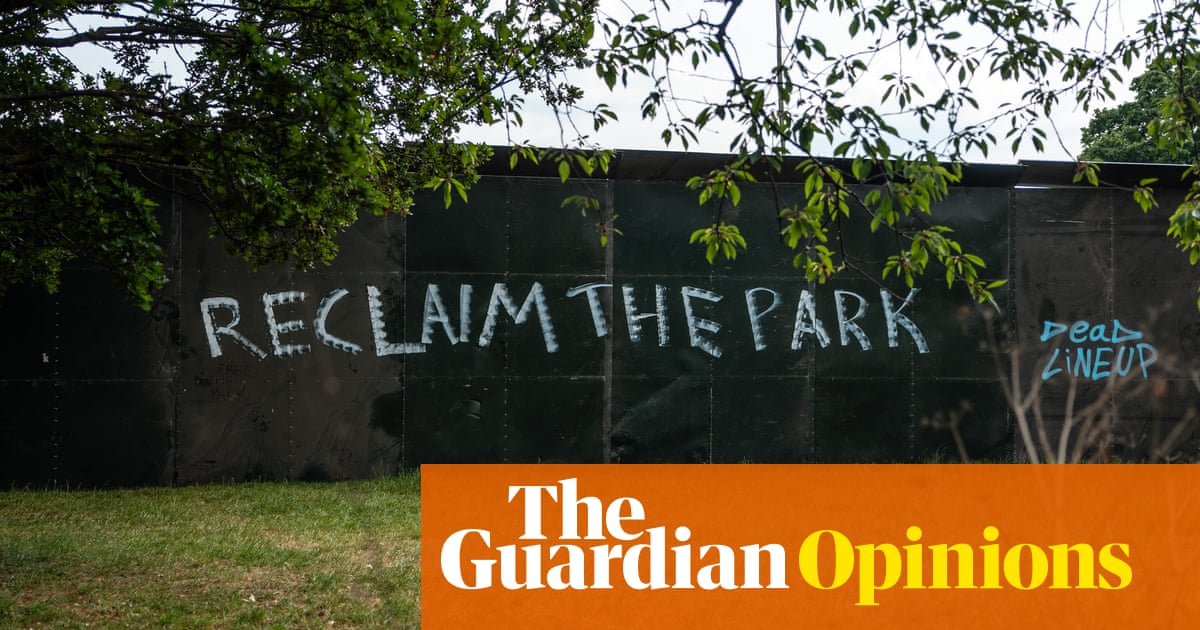
Naomi Klein on End Times Fascism
...European fascism of the 1930s and 1940s also had a horizon: a vision for a future golden age after the bloodbath that, for its in-group, would be peaceful, pastoral and purified. Not today.
Alive to our era of genuine existential danger – from climate breakdown to nuclear war to sky-rocketing inequality and unregulated AI – but financially and ideologically committed to deepening those threats, contemporary far-right movements lack any credible vision for a hopeful future. The average voter is offered only remixes of a bygone past, alongside the sadistic pleasures of dominance over an ever-expanding assemblage of dehumanized others.

When Naomi Klein met ANOHNI
Rolling Stone UK on how music is responding to right wing populism...
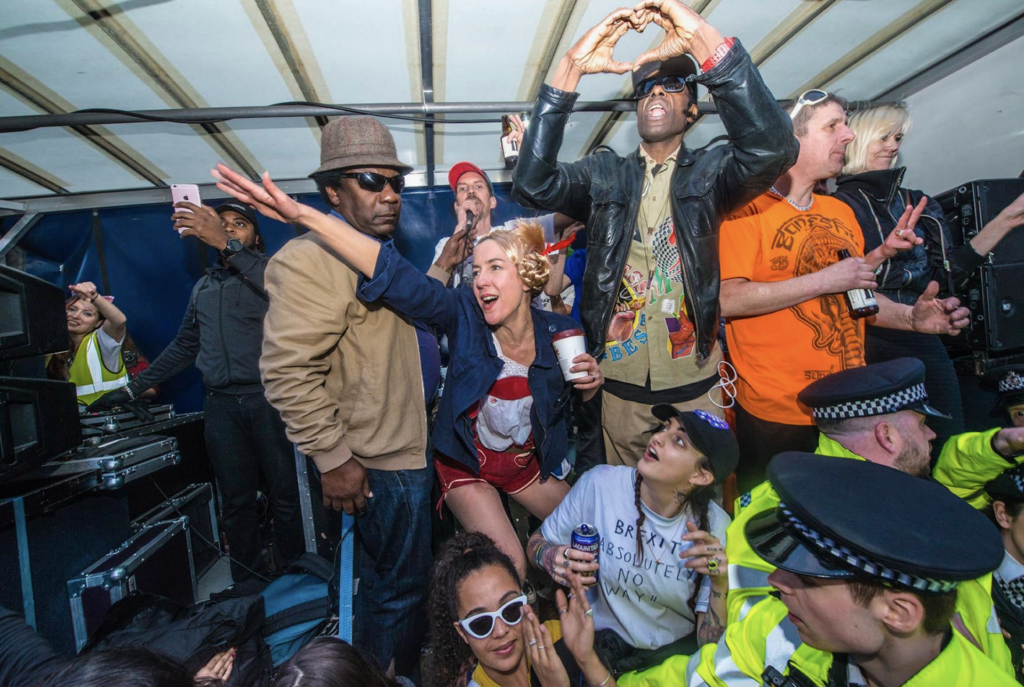
Here's Brian Eno speaking at a recent event for Patriotic Millionaires about why he’s happy to pay a wealth tax. As the name suggests, Patriotic Millionaires are millionaires who campaign to tax the rich, which would mean we could afford to prioritise things like renewable energy, insulating homes, better public transport, etc as well as address inequality and a myriad of other things in society.
A new study shows music fans want to lower their carbon footprints. Billie Eilish and other artists are working with REVERB to make concerts greener
The REVERB study surveyed 35,000 fans at more than 400 concerts. It found that carbon emissions of fan travel to an average show equals 110 homes’ energy usage for a year, or 527 metric tons of carbon emissions. Fan travel exceeds band and crew travel, hotel stays, and gear transport by 38 times. But the good news is that almost 90 percent of fans would potentially be interested in more climate-friendly travel options if better infrastructure, incentives, and information were available.

A Greener Festival’s Annual Festival Sustainability Insights, which showed that more festivals across Europe are going plant-based, and that the equivalent emissions of food and drink can be more than 30% of the entire event impact, including travel, and can be drastically reduced by eliminating meat and dairy.
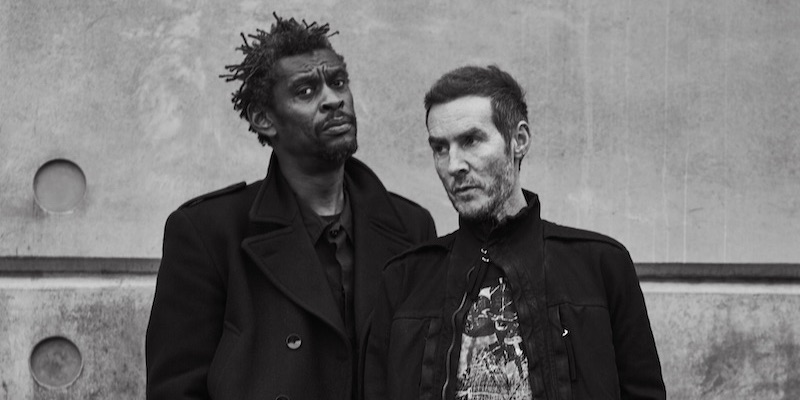
Campaigners mock Katy Perry and Amazon
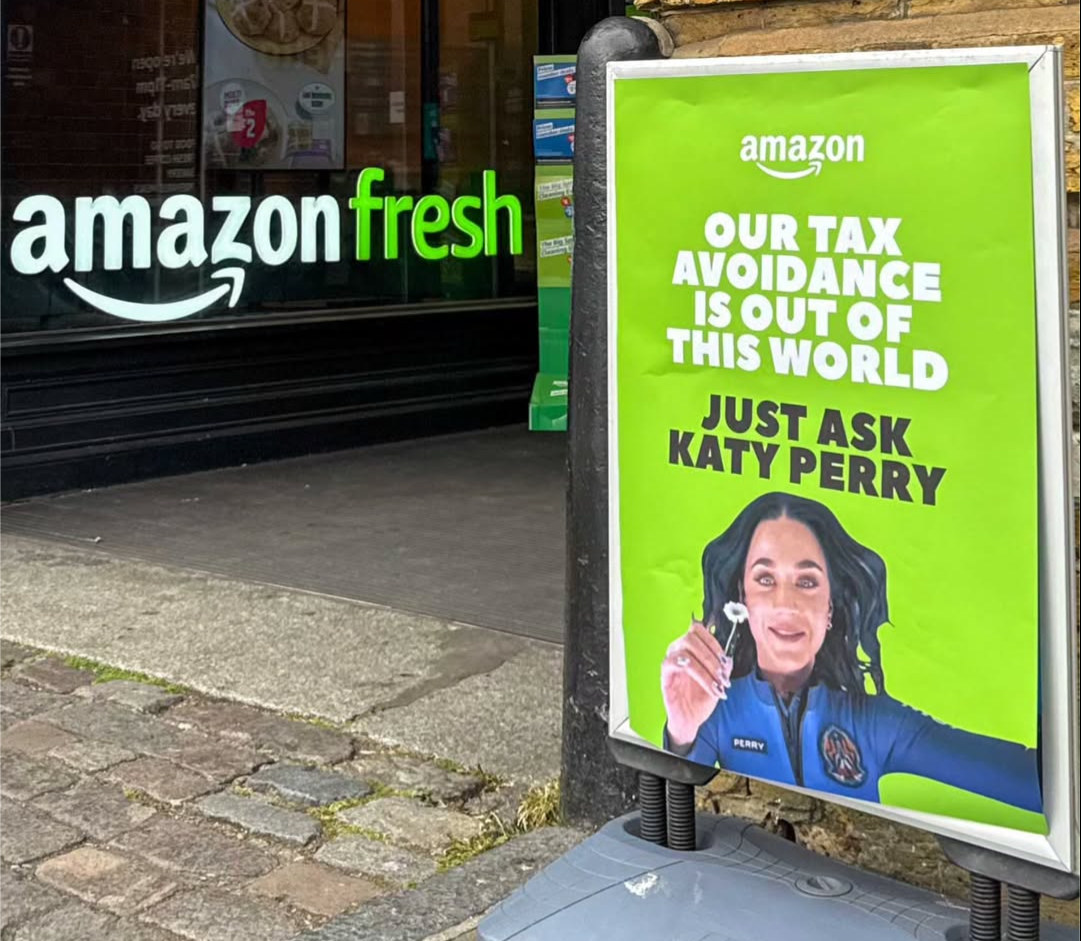
A fascinating read from Slow Factory, which begins:
Each April, Earth Month invites reflection on our planet’s worsening conditions. Yet too often, these discussions remain detached from the histories of violence that continue to shape our relationship with nature. Dominant narratives tend to emphasize either individual responsibility or technological fixes, overlooking the structural forces—colonialism, capitalism, and militarization—that dispossess Indigenous peoples and drive the ongoing destruction of our planet in pursuit of profit.
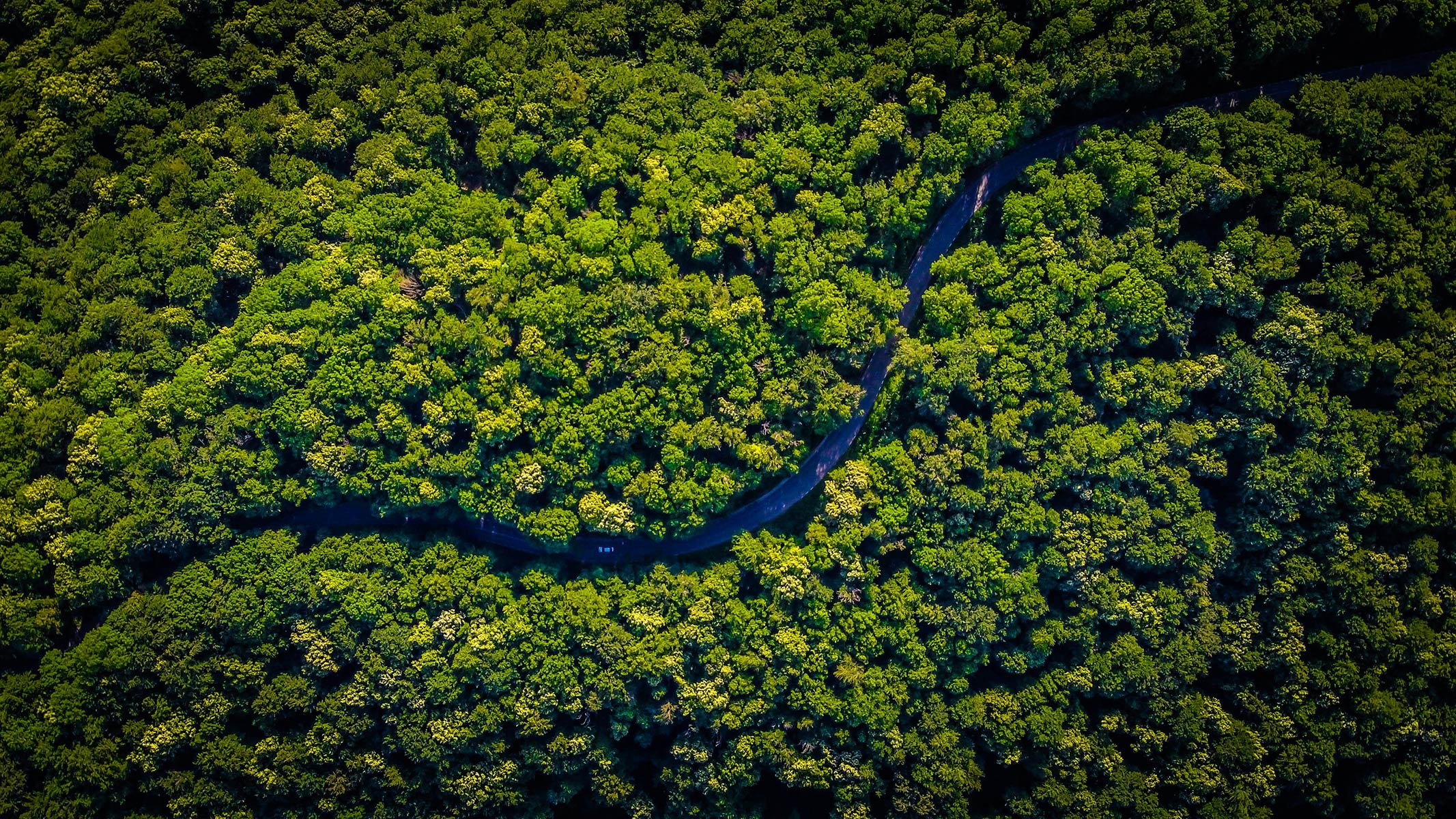
WWF and Music Declares Emergency joined forces for Earth Day 2025 to launch the Music Nature Map - a celebration of the wild places that inspire artists across the UK and Ireland.
